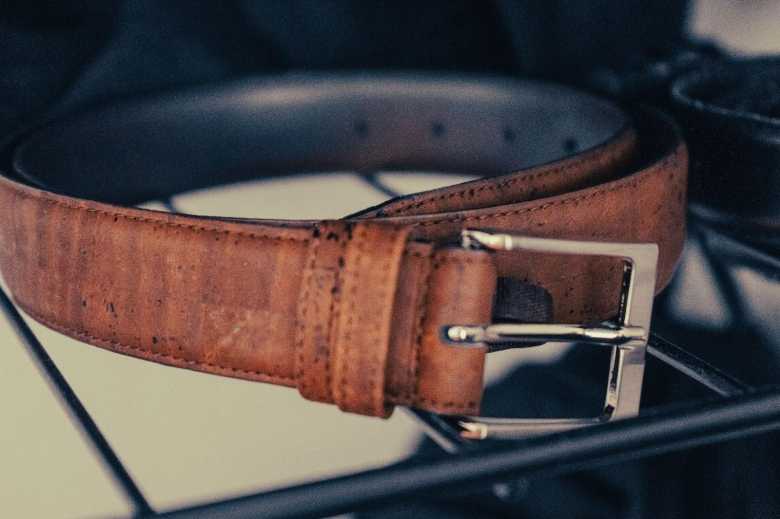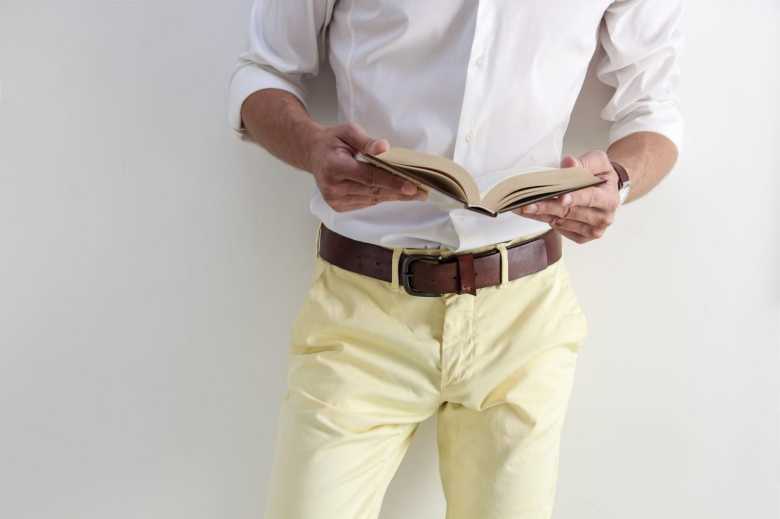Belt or No Belt? The Age-Old Men’s Fashion Debate Resolved
Is it ever ok to wear no belt with dress pants? Are you supposed to wear a belt with a suit? Should you wear a belt with jeans? These questions have been plaguing fashionable men for at least a century. So today, we ask the Oliver Wicks team to take on this divisive matter and some tips to help you choose which camp to join. Yes, there are several schools of thought on this!
Wear a Belt If…
Let’s jump right into it. When is it not ok to skip a belt? First up, we’d say not wearing a belt with dress pants is usually a no-no. Not because we feel like being the most demanding fashionistas on the block, but because the belt loops look odd with nothing to do. While you can probably camouflage this in a casual, untucked shirt, it just looks strange any time you’re tucking a formal shirt in. However, a facet of mass-market pant design is not a hard-and-fast rule. When you have garments made-to-measure, belt loops are not a given.
We also advise you to wear a belt if you don’t know what to do otherwise. A plain black or brown leather belt and matched shoes will never be completely wrong in any crowd or space. It’s not always a correct choice, but it can’t be seen as rude.
It’s also important to remember that a belt isn’t just a fashion accessory- it’s there to help your pants fit your body better. In particular, your belt wards off the notorious “plumber’s crack” when you kneel or squat while still allowing the pants to be roomy enough that you can move in them. So wear a belt to improve the fit of your casual pants, too. However, once you venture into suit pants and formalwear, get the pants appropriately tailored- your belt should then be an accessory, not a substitute for proper tailoring, and be worn as dress belts! So the more casual the pants, the more appropriate the belt, and vice versa.
Let’s talk style. A belt makes for a good visual break if you’re wearing all one color, especially on casual looks. It’s an excellent way to build contrast so that your shoes don’t stick out too much, too. For example, imagine an all-navy outfit with brown shoes. Now add a brown braided leather belt. Looks better, right? A belt can also be leveraged to add texture and interest to a look. Style advice may be hard to come by, but the more you play around with the belts you wear for what, the more likely it will be that you find the perfect belt for every occasion or everyday belt wear.

Don’t Wear a Belt If…
So when is it ok to consider wearing pants without a belt? First off, there is no-belt fashion out there designed deliberately, so you don’t wear a belt. Likewise, while unusual unless custom made, you will find suit trousers without belt loops, in which case skip the belt. Finally, never try to force a belt onto a pair of pants not designed for it.
Many who follow modern men’s fashion trends also believe that your tailoring should speak for itself. So you need impeccably fitted pants so that you can skip the belt and create a minimal silhouette that focuses attention elsewhere. This school of thought does make sense. A belt adds bulk to your waist to a point where many other layers are already coming together. So you achieve a smoother silhouette without it.
Likewise, a belt isn’t suitable for intentionally loose pants, nor should you use them as a crutch for pants that just happen to be far too loose. Not only will the cinching affect the fabric, but it also looks sloppy and lazy. Put the pants aside and let a tailor tackle them.
A tuxedo outfit or a cumberbund can be used, does not need a belt, and you’ll see that most tux pants don’t even have belt loops. Many feel that men’s belts count as informal wear and that it’s more favorable to wear suit pants with empty belt loops than a belt to the most formal functions. If this is you, you aren’t alone and won’t be ‘wrong’ either, but it is subjective.
Do you favor slimline shirts? Then you may wish to graduate to skipping the belt, as the overall look of a belt interrupts the sleek line you are creating. Skipping a belt enables you to be more out-there with your shoe choices, too, whether that's crisp sneakers under a casual look or a fancy dyed suede for your loafers. Because there’s no necessity to match the two, it’s far easier to let your shoes speak.

Alternatives to Belts
If you want to finish off the waist area of your outfit but don’t feel that a belt is the right match, what can you use instead? The main idea is to have your pants tailored well enough not to need anything at all.
However, sometimes you want to finish your look. For this, you should consider suspenders. If you are self-conscious, some brands of men’s suspenders are ‘hidden’ or designed to be worn under your shirt and not be visible. However, we’d encourage you to go bold and try a classic suspender simply. They lend their own charm to an outfit and will allow you to complete your look without any awkwardness. So why hide what is a perfectly stylish men’s fashion choice?
If you hate the look of belts but feel your body needs that last minor tweak to the waist that a belt would give, ask your suit maker if they are willing to create side tabs on your pants for you (more on these just below). These will allow you to tweak the fit of the pants without the need for a separate accessory, and you can keep an ultra-lean line. We wouldn’t suggest going as far as to play around with the many other ‘hidden’ buttons and waist fits you see advertised. Most are gimmicks, and they all cover up a problem that’s easy to solve- tailor your pants well, so belt no belt choice is fashion, not a necessity. Remember that a belly should also suit your body shape, belts are made for a variety of different waist sizes, don't fret not finding your perfect belt!
Should I Wear a Belt with a Suit?

As you can see, there is no one solid answer to the belt or no belt with a suit question. While modern fashion-forward men view no belt with a suit as a better line and a more formal look that showcases your tailoring, older or more traditional men may say that a belt and suit must be worn together. So is a belt necessary for a suit? It’s more up to you than a hard and fast rule.
It’s worth diving deeper into fashion history, however. In the early 20th century, men did not wear a belt with a suit of any style. They didn’t even have belt loops! Instead, they had pull-tabs at the side of their dress pants to make final adjustments to the waist. If necessary, they would use suspenders. Belt loops only became a ‘thing’ in men’s fashion when mass production and standardized sizing came into play. To this day, it’s still acceptable to order bespoke or made-to-measure suits with no belt loops at all. So is a belt necessary for formals? No, not really, although it depends on the function and there is no blanket choice- Your choice of funeral clothing will not be the same as for what you pick for a black-tie wedding.
We also mentioned above that many ‘high-end’ part suits, like tuxedos, won’t come with belt loops at all. Belts can also look odd and lumpy under a three-piece suit, as the waistcoat taper will sit over the beltline if it’s the correct length. This does imply that the most formal renditions of a man’s suit should rely on good tailoring matched with a well-fitted, correctly measured suit, not a belt, to fit well.
However, modern men’s fashion rules are becoming more “anything goes.” Therefore, if you feel that a belt completes the look of a suit, wear it. Do not, however, use a belt with a suit to compensate for fit errors. Make your belt an accessory, not a necessity.
What kind of belt to wear with a suit? Opt for a discrete and slimline belt, and match the leather to your shoes. If you’d rather skip it, do so- but do consider that empty belt loops look a little weird, and try to choose your fashion accordingly.
Should I Wear a Belt with Jeans?
On the other hand, Jeans are traditionally created with a belt loop. They are also the epitome of men’s casualwear, even though they have been dressed up successfully for smart casual and business casual with a blazer. Wearing belts with jeans goes hand in hand and finishes the look of this specific garment. Remember that jeans were created as ‘working men’s wear’, so the belt was used to adjust the final fit. We would suggest using a rugged, thicker belt than you would with a suit to echo this history. Here is an opportunity to wear tooled leather or a western-style belt, too, for a bit of texture and variety.
But, as you can see, this is a fashion choice at the end of the day. Some will argue that, while a more formal shirt with jeans should have a belt, a casual tee can skip it. The tucked vs. untucked argument again rears its head. An untucked ‘working man’ look with a lumberjack shirt will look finished with or without a belt. Wearing a belt with jeans is recommended but can be skipped, depending on how you feel about your look. The type of buckle you wear with your outfit, as well as if you are wearing skinny belts or not, will also determine the formality or appropriateness of your outfit.
Like tying a bow tie or making grenadine work with any outfit, knowing when to wear a belt and when to skip it is an art. It can also be challenging to understand if you’re newer to fashion, so we know if it still feels intimidating. So our top suggestion is to choose which look you like best and work around that. Remember that it becomes more appropriate the more casual the look, and less so, the more formal. If the pants don't have a belt loop, skip it. If you think the belt looks bulky or interrupts the flow of your outfit, skip it too. And get out of the habit of thinking of a belt as something that holds up your pants. Instead, invest in a bit of tailoring and let the belt become what it was meant to be, an accessory you can use when it pleases you, not a necessity to keep your pants up!
Conclusion
To belt or no belt, ultimately comes down to you and your preference, however, there are a few rules you need to follow if you are looking for formality and style combined.
